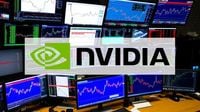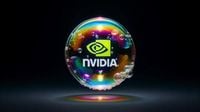Nvidia, a leading player in the artificial intelligence (AI) chip market, is facing significant challenges as its stock price dropped by more than 4.4 percent on March 26, 2025. The decline comes amid growing concerns over the profitability of investments in AI and new regulatory hurdles in China that threaten its market position.
After reaching a peak of 153.49 USD earlier in the year, Nvidia's stock entered a three-part correction, which concluded in a target range between 103.32 and 107.48 USD. This correction raised questions about whether the bulls had exhausted their resources following the recovery targets achieved in early January.
Investors are particularly wary following remarks made by Joe Tsai, Chairman of Alibaba, at the HSBC Global Investment Summit in Hong Kong. Tsai openly questioned the rationale behind the massive expenditures by US tech companies on AI infrastructure, stating, "I am surprised by the sums that US tech companies are investing in AI data centers." His skepticism highlights a growing unease about the sustainability of these investments.
Meanwhile, Nvidia's stock is approaching the critical 100 Euro mark, which adds to the sense of urgency among shareholders. The decline in stock prices is attributed to doubts surrounding the future of AI investments and the viability of data centers that rely heavily on Nvidia's chips.
Despite these challenges, Nvidia’s financial performance in the fourth quarter of 2023 showed significant growth, with both revenue and profit increasing substantially. This was accompanied by an optimistic forecast from the company, yet the stock remained under pressure due to concerns about competition from Chinese firms entering the AI market with efficient models.
Analysts from Motley Fool have suggested that Nvidia's all-time high of 147 Euro could be within reach again if macroeconomic conditions stabilize. They emphasize the underestimated potential of Nvidia, particularly in the context of a growing AI market that is likely to increase demand for high-performance chips, even in the face of competition from China.
Adding to the complexity of Nvidia's situation are the regulatory challenges it faces in China, a key market for its specialized chips. Reports indicate that Chinese regulators have instructed major tech companies not to purchase Nvidia's H20 chip, which was designed specifically for the Chinese market to bypass US export sanctions. The regulators argue that the chip violates local energy efficiency standards.
Although these rules are not yet strictly enforced, the potential for future restrictions looms large. Nvidia is reportedly in discussions with Chinese regulatory authorities and is preparing to make technical adjustments to the H20 chip, which could impact its competitiveness in the market.
The current market sentiment towards Nvidia reflects a precarious balance between geopolitical regulations, technical requirements, and market acceptance. Investors are increasingly unsettled, not just by political risks but also by rising doubts about the economic viability of the global AI investment wave.
As of March 26, 2025, at 13:57, Nvidia's stock was trading on Tradegate at a price of 110.2 EUR, reflecting a decrease of -1.43 percent. This downturn serves as a stark reminder of the volatility in the tech sector, especially for companies like Nvidia that are heavily reliant on the AI boom.
The question for shareholders now is whether to buy or sell. A new analysis released on the same day indicates that urgent action may be required for Nvidia shareholders. Investors are left to weigh the potential benefits of entering or exiting their positions in light of the current market dynamics.
Despite the challenges, Nvidia remains a significant player in the AI chip market. The company's ability to navigate the complexities of regulatory pressures and competition will be crucial in determining its future trajectory. As the demand for AI technologies continues to grow, Nvidia's long-term outlook may still hold promise, provided it can adapt to the evolving landscape.
In conclusion, Nvidia's recent stock performance illustrates the intricate interplay between market sentiment, regulatory hurdles, and the ongoing evolution of AI technology. Investors will need to stay informed and vigilant as the situation develops, balancing the potential for growth against the risks posed by external factors.






